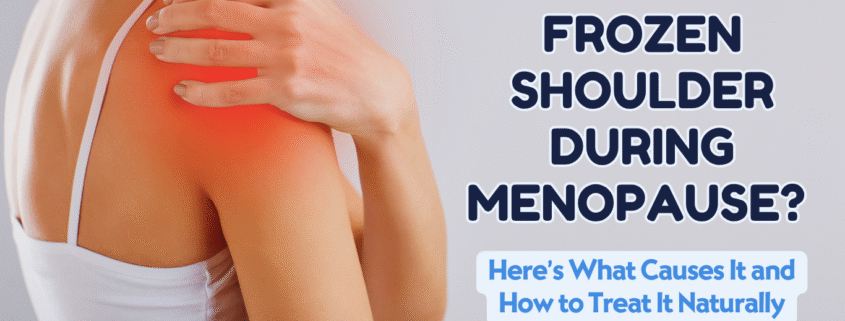Frozen Shoulder During Menopause? Here’s What Causes It and How to Treat It Naturally
Is Frozen Shoulder Linked to Menopause? Here’s What You Need to Know
Frozen shoulder — also known as adhesive capsulitis — isn’t officially recognised as a menopause symptom, but if you’re a woman between 40 and 60 and have suddenly found your shoulder feeling stiff, painful, or difficult to move, you’re not imagining it. There’s a real connection between menopause and this frustrating condition.
So, what’s going on behind the scenes? And more importantly, what can you do about it? Let’s take a closer look at the causes and treatment of frozen shoulder, especially during menopause.

The Hidden Link Between Hormones and Frozen Shoulder
During perimenopause and menopause, your body experiences a natural decline in estrogen — a hormone that plays a crucial role in keeping tissues supple and joints well-lubricated. As estrogen levels drop, connective tissue can become less flexible, leading to stiffness, inflammation, and reduced mobility.
Other hormonal shifts also add to the problem:
-
Thyroid changes in midlife can affect metabolism and tissue repair.
-
Blood sugar fluctuations can make tendons and ligaments less resilient.
-
Chronic stress and high cortisol can increase inflammation, worsening stiffness and pain.
In short, while menopause doesn’t cause frozen shoulder directly, the hormonal rollercoaster makes your body more vulnerable to it.
The Mind-Body Connection
Frozen shoulder isn’t just about the joint — it’s about how your whole body is functioning. Hormonal imbalance, poor blood sugar control, and chronic stress all contribute to inflammation that can show up as tightness, soreness, or limited range of motion. That’s why addressing your body’s internal balance can often bring the biggest external relief.
Supporting Your Body Naturally
This is where Slenderiiz Day and Night Drops come in. While they’re known for supporting healthy weight management, their benefits extend far beyond the scale. These innovative drops are designed to help:
-
Balance hunger and metabolism hormones — supporting thyroid function and steady energy.
-
Regulate blood sugar levels — reducing inflammation that can worsen joint stiffness.
-
Support stress recovery — by helping your body manage cortisol and improve circulation.
When your hormones and blood sugar are more stable, your body feels calmer, more energised, and better equipped to heal — even in stubborn cases like frozen shoulder.
Moving Forward with Confidence
If you’re struggling with the pain and frustration of frozen shoulder during menopause, know that you’re not alone — and you don’t have to “just live with it.” Understanding the causes and treatment of frozen shoulder means recognising the powerful role your hormones play.
By nurturing your body from the inside out with tools like the Slenderiiz Day and Night Drops, you can bring your system back into balance, reduce inflammation, and regain your freedom of movement — naturally.
Because when your body feels balanced, everything moves better — including your shoulders.





Leave a Reply
Want to join the discussion?Feel free to contribute!